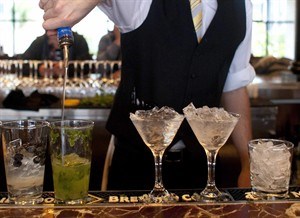
FILE - In this Monday, Nov. 19, 2012 file photo, a bartender prepares alcoholic drinks at a restaurant in San Francisco. Middle-aged men risk a faster mental decline as they age if they've been drinking heavily for years, new research suggests. The work was published Wednesday, Jan. 15, 2013 by the journal Neurology. (AP Photo/Eric Risberg)
January 15, 2014 - 1:21 PM
NEW YORK, N.Y. - Middle-aged men risk a faster mental decline as they age if they've been drinking heavily for years, new research suggests.
The study of about 5,000 British civil servants found that over a decade, the added decline was the equivalent of about two extra years of aging for a combined measure of mental abilities like reasoning, and about six years for memory. The heavy drinkers' abilities were compared to those of men who drank moderately or abstained.
It's no surprise that heavy alcohol consumption can affect the brain, but the study focuses on an age range that has received much less attention from alcohol researchers than the elderly and college students.
The work was published online Wednesday by the journal Neurology. Researchers found no such effect in women, but the study included too few female heavy drinkers to test the effect of drinking the same amount as in men, said Severine Sabia, a study author from University College London.
In an email, she said it was not possible to identify a specific minimum level of consumption at which the risk begins in men.
Her study used data from over 20 years. Using questionnaires, researchers calculated the men's average daily intake of alcohol for the decade up to when they were an average of 56 years old. Then, they tracked decline in mental abilities over the following decade from tests administered every five years.
Accelerated decline was seen for the heaviest-drinking group, which included 469 men with a wide range of alcohol intake. The minimum amount was the equivalent of about 13 ounces of wine a day or about 30 ounces of beer. The maximum was about three times that.
Men drinking that minimum amount are not necessarily at risk for accelerated mental decline, since the results pertain to the category overall, said Sara Jo Nixon, a substance abuse researcher at the University of Florida in Gainesville, who did not participate in the work.
She also said that the study shows a link between drinking and faster mental decline but not proof that alcohol intake was responsible. And she said that because of the sensitive mental tests used in the study, the extra declines in performance may be too subtle to make a difference in daily life. Sabia said she believed the difference would eventually be noticeable.
Still, Nixon said, the study "does suggest that middle-aged to young-old individuals do need to pay attention to what their drinking habits have been, and are."
___
Online:
Neurology: http://www.neurology.org/
___
Malcolm Ritter can be followed at http://www.twitter.com/malcolmritter
News from © The Associated Press, 2014